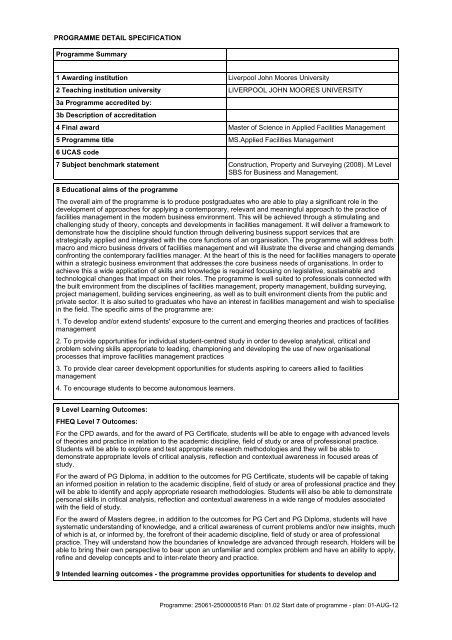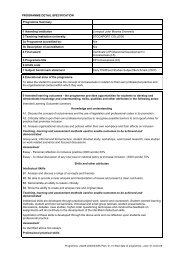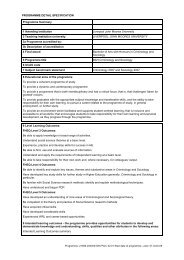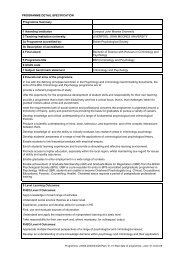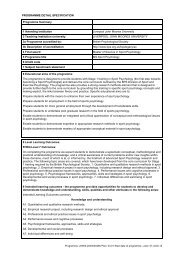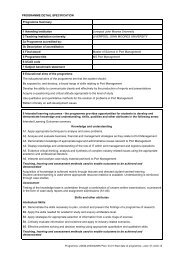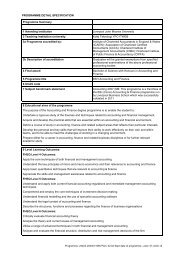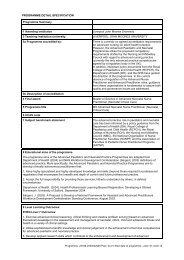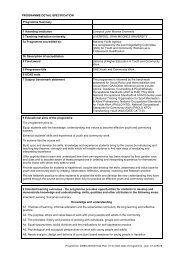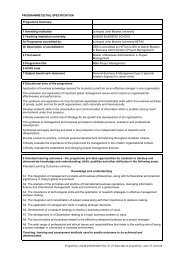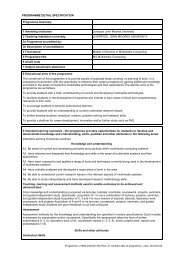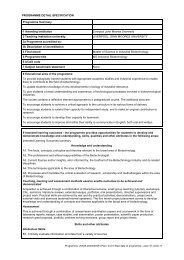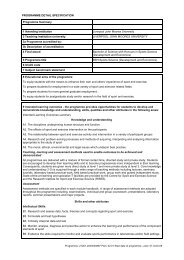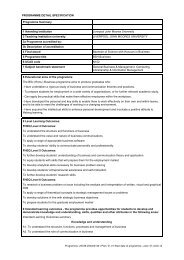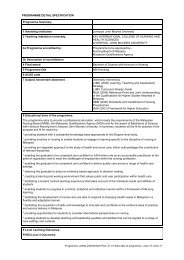Applied Facilities Management - Liverpool John Moores University
Applied Facilities Management - Liverpool John Moores University
Applied Facilities Management - Liverpool John Moores University
You also want an ePaper? Increase the reach of your titles
YUMPU automatically turns print PDFs into web optimized ePapers that Google loves.
PROGRAMME DETAIL SPECIFICATION<br />
Programme Summary<br />
1 Awarding institution <strong>Liverpool</strong> <strong>John</strong> <strong>Moores</strong> <strong>University</strong><br />
2 Teaching institution university LIVERPOOL JOHN MOORES UNIVERSITY<br />
3a Programme accredited by:<br />
3b Description of accreditation<br />
4 Final award Master of Science in <strong>Applied</strong> <strong>Facilities</strong> <strong>Management</strong><br />
5 Programme title MS.<strong>Applied</strong> <strong>Facilities</strong> <strong>Management</strong><br />
6 UCAS code<br />
7 Subject benchmark statement Construction, Property and Surveying (2008). M Level<br />
SBS for Business and <strong>Management</strong>.<br />
8 Educational aims of the programme<br />
The overall aim of the programme is to produce postgraduates who are able to play a significant role in the<br />
development of approaches for applying a contemporary, relevant and meaningful approach to the practice of<br />
facilities management in the modern business environment. This will be achieved through a stimulating and<br />
challenging study of theory, concepts and developments in facilities management. It will deliver a framework to<br />
demonstrate how the discipline should function through delivering business support services that are<br />
strategically applied and integrated with the core functions of an organisation. The programme will address both<br />
macro and micro business drivers of facilities management and will illustrate the diverse and changing demands<br />
confronting the contemporary facilities manager. At the heart of this is the need for facilities managers to operate<br />
within a strategic business environment that addresses the core business needs of organisations. In order to<br />
achieve this a wide application of skills and knowledge is required focusing on legislative, sustainable and<br />
technological changes that impact on their roles. The programme is well suited to professionals connected with<br />
the built environment from the disciplines of facilities management, property management, building surveying,<br />
project management, building services engineering, as well as to built environment clients from the public and<br />
private sector. It is also suited to graduates who have an interest in facilities management and wish to specialise<br />
in the field. The specific aims of the programme are:<br />
1. To develop and/or extend students' exposure to the current and emerging theories and practices of facilities<br />
management<br />
2. To provide opportunities for individual student-centred study in order to develop analytical, critical and<br />
problem solving skills appropriate to leading, championing and developing the use of new organisational<br />
processes that improve facilities management practices<br />
3. To provide clear career development opportunities for students aspiring to careers allied to facilities<br />
management<br />
4. To encourage students to become autonomous learners.<br />
9 Level Learning Outcomes:<br />
FHEQ Level 7 Outcomes:<br />
For the CPD awards, and for the award of PG Certificate, students will be able to engage with advanced levels<br />
of theories and practice in relation to the academic discipline, field of study or area of professional practice.<br />
Students will be able to explore and test appropriate research methodologies and they will be able to<br />
demonstrate appropriate levels of critical analysis, reflection and contextual awareness in focused areas of<br />
study.<br />
For the award of PG Diploma, in addition to the outcomes for PG Certificate, students will be capable of taking<br />
an informed position in relation to the academic discipline, field of study or area of professional practice and they<br />
will be able to identify and apply appropriate research methodologies. Students will also be able to demonstrate<br />
personal skills in critical analysis, reflection and contextual awareness in a wide range of modules associated<br />
with the field of study.<br />
For the award of Masters degree, in addition to the outcomes for PG Cert and PG Diploma, students will have<br />
systematic understanding of knowledge, and a critical awareness of current problems and/or new insights, much<br />
of which is at, or informed by, the forefront of their academic discipline, field of study or area of professional<br />
practice. They will understand how the boundaries of knowledge are advanced through research. Holders will be<br />
able to bring their own perspective to bear upon an unfamiliar and complex problem and have an ability to apply,<br />
refine and develop concepts and to inter-relate theory and practice.<br />
9 Intended learning outcomes - the programme provides opportunities for students to develop and<br />
Programme: 25061-2500000516 Plan: 01.02 Start date of programme - plan: 01-AUG-12
demonstrate knowledge and understanding, skills, qualities and other attributes in the following areas:<br />
Intended Learning Outcomes summary<br />
Knowledge and understanding<br />
A1. The importance of facilities management and its application in a strategic business context.<br />
A2. The concept of managing both staff and clients and the managerial implications of doing so effectively in<br />
facilities management.<br />
A3. Implications of dealing with managerial issues such as partnerships, relationships, motivation, leadership<br />
within the facilities management industry.<br />
A4. Appropriate strategies and change mechanisms for achieving strategic facilities management.<br />
A5. Business considerations for investment in facilities management.<br />
A6. The impact of legislation, finance and risk in a changing commercial environment on facilities management.<br />
A7. The management and leadership of sustainability issues with regard to facilities management.<br />
A8. The specific steps for introducing a change towards more sustainable forms of facilities management within<br />
organisations.<br />
A9. The role and utilisation of the physical asset within facilities management and the changing nature of a<br />
buildings functionality and sophistication.<br />
A10. The diverse nature of the facilities management industry and the exchange of best practice to enhance<br />
awareness and application.<br />
A11. The specific steps for introducing a change towards more sustainable forms of construction within<br />
organisations.<br />
A12. The research process in terms of the preparation and production of a postgraduate research study.<br />
A13. For MSc students only: the preparation of a dissertation based on a study in appropriate depth of a topic<br />
related to sustainability in the built environment.<br />
Teaching, learning and assessment methods used to enable outcomes to be achieved and<br />
demonstrated<br />
Core knowledge and understanding is achieved through the use of a range of appropriate teaching methods.<br />
These include online lectures, online tutorials, online seminars, practical work, coursework, projects and guided<br />
independent study supported via the <strong>University</strong> VLE. All the course material (online lecture notes, tutorial<br />
exercises, courseworks, project specifications, reading material) will be provided in electronic form. Students will<br />
make use of Blackboard and Wimba (as the online communication tool).<br />
Assessment<br />
Knowledge and understanding is assessed using a range of techniques which include traditional essay based<br />
coursework assignments, work-based assignments which us the students workplace as the environment for<br />
carrying out action based learning, on-line assessments and workshop presentations. Assessment methods for<br />
each module are specified in the module specifications.<br />
Intellectual Skills<br />
Skills and other attributes<br />
B1. Undertake the critical evaluation of approaches to facilities management adopted by organisations and its<br />
application in the strategic business environment.<br />
B2. Understand and apply the tools to critically analyse the management of both staff and customers in the<br />
facilities management context.<br />
B3. To analyse the use of different managerial applications to management staff and customers such as<br />
partnerships, motivation, and leadership.<br />
B4. Articulate and demonstrate knowledge and understanding of applying appropriate strategies and change<br />
mechanisms to deal with facilities management at the strategic business level.<br />
B5. Understand in depth how to analyse and evaluate business considerations for investment in facilities<br />
management<br />
B6. Use appropriate techniques to minimise risks in relation to legislation, compliance and finance in the context<br />
of facilities management.<br />
B7. Critically assess decision-making processes in relation to complex sustainability-related issues concerned<br />
with the management of facilities management<br />
B8. Analyse and apply methods for embedding sustainability into the management of facilities.<br />
B9. Critically appraise alternative best practice methods and techniques for delivering facilities management<br />
Programme: 25061-2500000516 Plan: 01.02 Start date of programme - plan: 01-AUG-12
processes across different business sectors.<br />
B10. Understand the change management implications of moves towards more intelligent buildings on the role<br />
and utilisation of facilities managers<br />
B11. Analyse key theories, concepts and methodological issues related to research in facilities management.<br />
B12. Understand the change management implications of moves towards more sustainable approaches to<br />
construction.<br />
B13. Analyse key theories, concepts and methodological issues related to research in sustainable built<br />
environments.<br />
B14. For MSc students only: gather, present, analyse and interpret primary and / or secondary data in<br />
appropriate forms to a number of audiences.<br />
Teaching, learning and assessment methods used to enable outcomes to be achieved and<br />
demonstrated<br />
A mixture of methods will be used which include: a) practical case studies in order to develop relevant skills and<br />
the confidence to use them. These will be carried out in small groups in a workshop environment, b) a<br />
combination of lectures and workshops to develop students' practical understanding of business simulation<br />
modelling as applied to facilities management, c) programme and module induction sessions, tutorials,<br />
discussions and debates, workshops and guided independent study. Students will be given an opportunity to<br />
attend induction sessions and workshops remotely at scheduled times notified in advance.<br />
Assessment<br />
Assessment of a student's intellectual skills will be undertaken by a variety of means. This will include informal<br />
assessment of the ability to critically analyse relevant literature and debate issues within confined peer groups<br />
together with the formal assessment at the end of each module.<br />
Professional practical skills<br />
C1. To be able to formulate facilities management strategy that focuses on leadership and managerial<br />
requirements.<br />
C2. Effectively engage with key stakeholders within the field of facilities management.<br />
C3. Conduct reviews and explore the strengths and weaknesses of different managerial approaches.<br />
C4. To be able to influence and implement the strategic direction of the facilities management function in<br />
response to business and technological requirements and changes.<br />
C5. Produce a risk management framework for the effective compliance and regulation of facilities management<br />
processes.<br />
C6. Produce a financial appraisal of the facilities management function.<br />
C7. To be able to formulate a strategy to deal with the complex sustainability issues concerned with facilities<br />
management.<br />
C8. Carry out appraisals of building functionality and optimise the role and utilisation of facilities managers.<br />
C9. Evaluate innovative and practical facilities management solutions within the context of different business<br />
sectors.<br />
C10. To be able to appraise the appropriateness of different research methods to solve a problem or investigate<br />
an issue.<br />
C11. For MSc students only: effectively use research techniques at each stage of the research process to<br />
investigate facilities management problems / issues in the built environment.<br />
Teaching, learning and assessment methods used to enable outcomes to be achieved and<br />
demonstrated<br />
The acquisition of practical skills will be encouraged and developed within individual modules via workshops<br />
using relevant case studies from industry as the teaching vehicle.<br />
Assessment<br />
Students' practical skills will be assessed within discrete modules via formal coursework assignments linked to a<br />
variety of case study material.<br />
Transferable / key skills<br />
D1. Identify the personal ethics and values of key stakeholders and how these impact on managerial and<br />
leadership styles and decisions.<br />
D2. Apply the various descriptive and inferential techniques of facilities management to different managerial<br />
scenarios.<br />
D3. Develop personal competencies to the achievement of strategic facilities management in the built<br />
Programme: 25061-2500000516 Plan: 01.02 Start date of programme - plan: 01-AUG-12
environment including the ability to reflect on decisions and outcomes and take positive decisions to effect<br />
change.<br />
D4. Be confident in managing facilities management issues associated with regulation, compliance and risk.<br />
D5. Be confident in managing the technological and functional issues associated with managing and operating<br />
intelligent buildings.<br />
D6. Use best practice techniques and methods to manage facilities management services across different<br />
business sectors.<br />
D7. Apply the various techniques for managing organisational change in terms of sustainable development.<br />
D8. Develop and present a research proposal to investigate a specific topic related to facilities management.<br />
D9. For MSc students only: be confident in synthesising findings and drawing appropriate conclusions and<br />
recommendations related to a problem or issue being investigated.<br />
Teaching, learning and assessment methods used to enable outcomes to be achieved and<br />
demonstrated<br />
Key skills are developed throughout the programme which aims to provide students with an appropriate<br />
environment in which to acquire and develop the necessary attributes of a professional in the field of facilities<br />
management in the built environment.<br />
Assessment<br />
On one module students' key skills will be tested via a formal presentation to a panel of experts selected for their<br />
particular experience and expertise within the field of sustainable development. This presentation will either take<br />
place in the university in a workshop at the end of the module or for those not able to attend remotely using<br />
appropriate information technology. Students will be interviewed and questioned on their submission and their<br />
ability to 'think on their feet' will be tested in conjunction with the knowledge and skills acquired during the<br />
programme of study. Other modules are examined by a variety of methods ranging from individual courseworks,<br />
work-based assignments, on-line assessments, presentations, and, for MSc students, a dissertation.<br />
10. Route/Pathway/Field requirements, levels, modules, credits and awards<br />
The programme is initially being offered in part-time mode, but is designed to be flexible to meet the personal<br />
requirements of each student. A student studying part-time will be able to complete the MSc within two calendar<br />
years.<br />
The CPD in <strong>Applied</strong> <strong>Facilities</strong> <strong>Management</strong> can be awarded for the sucessful completion of 30 credits<br />
comprising the following two modules: 7070BEPG and 7072BEPG.<br />
The PG Certificate in <strong>Applied</strong> <strong>Facilities</strong> <strong>Management</strong> can be awarded for the successful completion of 60 credits<br />
comprising the following modules: 7070BEPG, 7071BEPG, 7072BEPG and 7073BEPG.<br />
The PG Diploma in <strong>Applied</strong> <strong>Facilities</strong> <strong>Management</strong> can be awarded for the successful completion of 120 credits<br />
comprising the following modules: 7070BEPG, 7071BEPG, 7072BEPG, 7073BEPG, 7074BEPG, 7076BEPG,<br />
7013BEPG and 7039PG.<br />
The MSc in <strong>Applied</strong> <strong>Facilities</strong> <strong>Management</strong> can be awarded to students who successfully complete 180 credits<br />
comprising Dissertation module 7014BEPG in addition to all modules for the PG Diploma.<br />
Award Requirements<br />
Master of Science in <strong>Applied</strong> <strong>Facilities</strong> <strong>Management</strong><br />
Masters Certificate of Professional Development in <strong>Applied</strong> <strong>Facilities</strong> <strong>Management</strong><br />
Postgraduate Diploma in <strong>Applied</strong> <strong>Facilities</strong> <strong>Management</strong><br />
Postgraduate Certificate in <strong>Applied</strong> <strong>Facilities</strong> <strong>Management</strong><br />
For information about awards, see http://www.ljmu.ac.uk/Academic_Enhancement/121984.htm<br />
Level 7 Potential Awards on completion Master of Science<br />
Core Option Award Requirements<br />
7013BEPG RESEARCH METHODS<br />
7014BEPG DISSERTATION<br />
7070BEPG STRATEGIC FACILITIES<br />
MANAGEMENT<br />
7071BEPG KNOWLEDGE AND<br />
INFORMATION MANAGEMENT<br />
7072BEPG MANAGING STAFF AND<br />
CUSTOMERS<br />
180 core credits at level 7<br />
0 option credits at level 7<br />
0 elective credits at level 7<br />
Programme: 25061-2500000516 Plan: 01.02 Start date of programme - plan: 01-AUG-12
7073BEPG LEGISLATION,<br />
FINANCE AND RISK<br />
7074BEPG INNOVATIVE<br />
FACILITIES MANAGEMENT<br />
7076BEPG MANAGING<br />
INTELLIGENT BUILDINGS<br />
7039PG LEADERSHIP FOR A<br />
SUSTAINABLE ENVIRONMENT<br />
11 Opportunities for work-related learning ( location and nature of activities)<br />
The programme has been developed with the support, through the development of professional qualifications, of<br />
the British Institute of <strong>Facilities</strong> <strong>Management</strong>. The curriculum design has been informed by the input from a<br />
steering group comprising of key industry representatives from a number of organisations involved in facilities<br />
management, including: AA Projects Ltd, Davis Langdon, Co-op Estates, HOCHTIEF <strong>Facilities</strong> <strong>Management</strong>,<br />
Merseyside Police, ACC <strong>Liverpool</strong>.<br />
A key feature of the programme is the opportunity provided for flexible work-based learning. The students will be<br />
able to take comparative study of comparing and contrasting different workplace environments to share facilities<br />
management best practice and innovation as the topic for in-depth study during a module.<br />
12 Criteria for admission<br />
Other<br />
Applicants will normally be expected to hold a first degree from an approved <strong>University</strong> of at least upper<br />
second-class honours level in a cognate or semi-cognate subject.<br />
Alternatively, candidates may possess a first degree of at least lower second-class honours level combined with<br />
a relevant professional qualification or relevant professional experience of at least two years.<br />
Mature entry<br />
Candidates without a first degree may qualify for entry to the programme on the basis of considerable relevant<br />
work experience normally comprising at least five years at managerial or equivalent level which would be subject<br />
to scrutiny by the programme team.<br />
Overseas qualifications<br />
Overseas candidates would normally be expected to possess one of the above entry qualifications and be able<br />
to demonstrate a standard of English with a minimum IELTS score of 6.5.<br />
13 Information about assessment regulations<br />
All programmes leading to LJMU awards operate within the <strong>University</strong>'s Academic Framework. Full details are<br />
available from:<br />
http://www.ljmu.ac.uk/Academic_Enhancement/121984.htm<br />
A programme operating within the Framework may be unable to comply with all the requirements of the<br />
Framework. In these circumstances the programme team may apply to the Academic Planning Panel for a<br />
programme variance which will be considered against agreed criteria that the variance is a nationally published<br />
condition of an accrediting / professional body, without which the programme could not be accredited.<br />
14 Indicators of quality:<br />
Research Assessment Exercise<br />
In the 2008 RAE, the School submitted research for the Architecture & Built Environment unit of assessment<br />
scoring an average ranking of 2.7, and achieving 14th place overall for all Institutions in the Guardian league<br />
table for this unit of assessment.<br />
Institutional audit outcomes<br />
The <strong>University</strong> is subject to Institutional Review by the Quality Assurance Agency on a 6 year cycle. A published<br />
review report is then available on the QAA web site: www.qaa.ac.uk<br />
15 Support for students and their learning<br />
Induction programme for new students with introduction to the programme / programme team; computer system,<br />
the learning resource centre and the Virtual Learning Environment (Blackboard).<br />
LJMU Student Handbook.<br />
Student Programme Handbook.<br />
Module Guides.<br />
Programme: 25061-2500000516 Plan: 01.02 Start date of programme - plan: 01-AUG-12
Pastoral care by Programme Team.<br />
Access to all <strong>University</strong> support systems including student welfare and guidance.<br />
The Learning Resource Centre.<br />
The Blackboard virtual learning environment.<br />
16 Methods for evaluating and improving the quality and standards of teaching and learning<br />
The Role of the External Examiner<br />
External examiners approved by the <strong>University</strong> are appointed to cover whole programmes or clusters of modules<br />
within programmes. The role of the external examiner is to provide informative comment and recommendations<br />
upon whether or not:<br />
- the <strong>University</strong> is maintaining the threshold academic standards set for awards in accordance with the<br />
frameworks for higher education qualifications and applicable subject benchmark statements<br />
- the assessment process measures student achievement rigorously and fairly against the intended outcomes of<br />
the programme(s) and is conducted in line with the <strong>University</strong> policies and regulations<br />
- the academic standards are comparable with those in other UK higher education institutions of which external<br />
examiners have experience<br />
- the achievement of students are comparable with those in other UK higher education institutions of which the<br />
external examiners have experience<br />
and to provide informative comment and recommendations on:<br />
- good practice and innovation relating to learning, teaching and assessment observed by external examiners<br />
- opportunities to enhance the quality of the learning opportunities provided to students.<br />
Subject standards for all taught programmes of study are specified using an outcome based learning model.<br />
Attainment is measured against the standard and individual student performance is moderated at assessment<br />
boards. This involves both internal moderation (by LJMU staff and/or partner institution staff) and external<br />
moderation (by External Examiners). Internal annual programme self-assessment is informed by broad ranging<br />
student feedback, external examiners and academic staff who conduct module review. External quality<br />
assessment by Professional Statutory Regulatory Bodies and the Quality Assurance Agency for Higher<br />
Education confirms that standards are set at the appropriate level and that quality of learning opportunities are<br />
subject to continuing improvement. The quality of teaching is assured through staff review and staff development<br />
in learning, teaching and assessment. Designated committees have responsibility for the oversight of processes<br />
wherein quality and standards are evaluated and improved.<br />
Please note: This specification provides a concise summary of the main features of the programme and the<br />
learning outcomes that a typical student might reasonably be expected to achieve and demonstrate if he/she<br />
takes full advantage of the learning opportunities that are provided. More detailed information on the learning<br />
outcomes, content, teaching, learning and assessment methods of each module can be found in the student<br />
module guide and course handbook. The accuracy of the information contained in this document is reviewed by<br />
the <strong>University</strong> and may be checked by the Quality Assurance Agency for Higher Education.<br />
17 Key sources of information about the course can be found in:<br />
Further details may be obtained from a series of handbooks for students that together provide comprehensive<br />
information. Detailed programme information is contained in definitive documentation for the programme. The<br />
Virtual Learning Environment (VLE) is increasingly used to provide module specific information.<br />
18 Progress Files<br />
Increasingly, academic guidance is provided within a framework of personal development planning linked to<br />
progress review.<br />
Programme: 25061-2500000516 Plan: 01.02 Start date of programme - plan: 01-AUG-12


